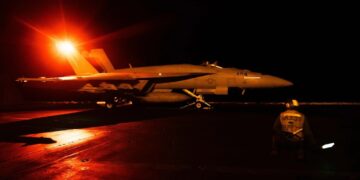FOR IMMEDIATE RELEASE:
January 11, 2024
Contact: press@defensepriorities.org
WASHINGTON, DC—Today, the U.S. carried out strikes on Houthi targets in Yemen, a response to continued Houthi attacks on shipping in the Red Sea. Defense Priorities Policy Director Benjamin H. Friedman issued the following statement in response:
“The strikes on the Houthis will not work. That is, they are very unlikely to stop Houthi attacks on shipping. The strikes’ probable failure will invite escalation to more violent means that may also fail. That is why striking the Houthis is a bad idea. They will leave policymakers looking feckless and thus tempted to up the ante to more pointless war to solve a problem better left to diplomatic means.
“The virtue of these airstrikes is that it will make those who like using violence to protect the fictional ‘rules-based international order’ feel good. It allows those who insist we ‘must do something more’ on behalf of global shipping to have a ‘something.’ But beyond the psychological health of elites, there is no payoff.
“Tactically, the attacks on a dozen or so targets are far too limited to deprive the Houthis of their ability to use missiles and drones to target shipping off their coast. Strategically, the punishment inflicted on the Houthis is essentially a pinprick, which will do little to deter attacks that Houthi leaders obviously think has a large political payoff in enhancing their domestic legitimacy. In underlining their claim to be battling Israel and its U.S. backers in defense of Gaza, the airstrikes may actually be welcomed by Houthi leaders.
“The fact is that the Houthi attacks on shipping have not been particularly effective, nor are they a major economic issue. The consequence is a minor price increase, borne primarily by European and Chinese consumers. That suggests that the imperative to solve this problem need not be Washington’s. But if it is, the diplomatic route seems best. Houthi demands to stop its attacks are to allow more aid into Gaza. Granting that, even if in secret, is far cheaper than war. It is, at minimum, an option worth exploring.”
More on Yemen

Featuring Rosemary Kelanic
July 27, 2025

Featuring Rosemary Kelanic
May 20, 2025

Featuring Rosemary Kelanic
May 17, 2025

By Kevin Joseph
May 12, 2025




